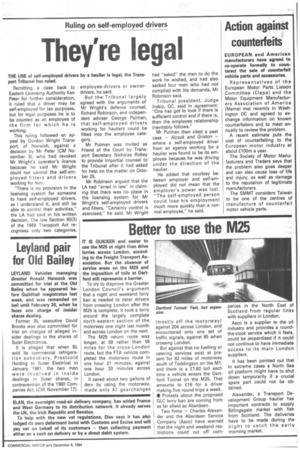They're legal
Page 7

If you've noticed an error in this article please click here to report it so we can fix it.
Remitting a case back to Eastern Licensing Authority Ken Peter for further consideration, it ruled that a driver may be self-employed for tax purposes, but for legal purposes he is to be counted as an employee of the firm for which he is working.
This ruling followed an appeal by Gordon Wright Transport, of Norwich, against a decision by Mr Peter (CM November 3), who had revoked Mr Wright's operator's licence because he said Mr Wright could not control the self-employed fitters and drivers working for him.
"There is no provision in the licensing system for someone to have self-employed drivers, as I understand it, and still be able to control their activities," the LA had said in his written decision. The law Section 95(3) of the 1968 Transport Act recognises only two categories, employee-drivers or ownerdrivers, he said.
But the Tribunal largely agreed with the arguments of Mr Wright's defence counsel, Richard Robinson, and independent adviser George Pulman, that self-employed drivers working for hauliers could be fitted into the employee category.
Mr Pulman was invited as Friend of the Court by Transport Secretary Nicholas Ridley to provide impartial counsel to the Tribunal after it had asked for help on the matter on October 25.
Mr Robinson argued that the LA had "erred in law" in claiming that there was no place in the licensing system for Mr Wright's self-employed drivers and fitters. "Certainly control is exercised," he said. Mr Wright had "asked" the men to do the work he wished, and had also sacked four men who had not complied with his demands, Mr Robinson said.
Tribunal president, Judge lnskip, QC, said in agreement: "One has got to look if there is sufficient control and if there is, then the employee relationship inevitably follows."
Mr Pulman then cited a past case — Alcock and Griston — where a self-employed driver from an agency working for a haulier was found to be its employee because he was driving under the direction of the haulier.
He added that courtesy between employer and self-employed did not mean that the employer's power was lost. "The self-employed person could lose his employment much more quickly than a normal employee," he said.




























































































